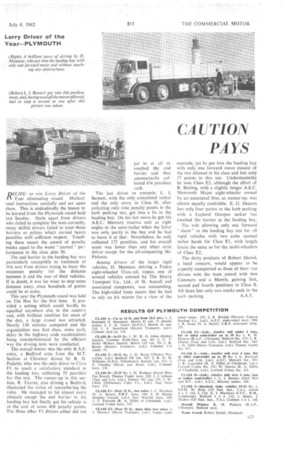CA MO A'
Page 57

If you've noticed an error in this article please click here to report it so we can fix it.
PAYS
DECIPE: to win Lorry Driver of Ilw It Year eliminating round. Method: read instructions carefully and act upon them. This is undoubtedly the lesson to be learned from the Plymouth round held last Sunday. Quite apart from drivers who failed to complete the tests correctly, many skilful drivers failed to treat those barriers or Pylons which carried heavy penalties with sufficient respect. Touching these meant the award of penalty marks equal to the worst "correct" performance in the class plus 50.
The end barrier in the loading bay was particularly susceptible to treatment of this sort from drivers trying to incur the minimum penalty for the distance between it and the rear of their vehicles. If in doubt, it was far wiser to stop some distance away, since hundreds of points could be at stake.
This year the Plymouth round was held on The Hoe for the first time. It provided a setting which could hardly be equalled anywhere else in the country and, with brilliant sunshine for most of the day, a large crowd was attracted. Nearly 130 vehicles competed and the organization was first class, some early delay in the highway code examinations being counterbalanced by the efficient way the driving tests were conducted.
• The overall winner Was the only R.A.F. entry, a Bedford artic from the M.T. Section at Chivenor driven by R. H. Picketts, who was the only driver in Class Fl to reach a satisfactory standard in the loading bay, collecting 55 penalties for this test. The runner-up in this section, R. Thorne, also driving a Bedford. illustrated the virtue of remembering the rules. He managed to hit almost every obstacle except •the end barrier in the loading bay but finally got his vehicle in at the cost of some 404 penalty points, The three other Fl drivers either did not
get in at all or touched the end harrier and thus automatically collected 454 penalties cacti.
The last driver to compete, L. 1. Bennett, with the only articulated tanker and the only entry in Class If, after collecting only nine penalty points in the kerb parking test, got into a fix in the loading bay. On his last move he got his A.E.C. Mercury tractive unit at right angles to the semi-trailer when the latter was only partly in the bay and he had to leave it at that. Nonetheless, he only collected 175 penalties, and his overall score was lower than any other artie driver except for the all-conquering Mr. Picketts.
Among drivers of the larger rigid vehicles, H. Menncar, driving a Foden eight-wheeled 12-cu.-yd. tipper, one of several vehicles entered by The Heavy Transport Co., Ltd., of St. Austell and associated companies, was outstanding. The high-sided body meant that he had to rely on his mirror for a view of the nearside, Yet he got into the loading bay with only one forward move instead of the two allowed in his class and lost only 17 points in this test. Understandably he won Class E2, although the effort of R. !totting, with a slightly longer A.E.C. Mammoth Major eight-wheeler owned by an associated ftrm, as runner-up, was almost equally creditable. E. G. Deacon lost only four points in the kerb parking with a Leyland Octopus tanker but touched the barrier in the loading bay. The rule allowing only one forward " shunt" in the loading bay test for all rigid vehicles with two axles seemed rather harsh for Class El, with length limits the same as for the multi-wheelers or Class E2.
The dairy products of Robert Daniel, a local concern, would appear to be expertly transported as three of their van drivers won the team award with two Commers and a Morris, gaining first, second and fourth positions in Class B. All three lost only two marks each in the kerb parking. A.A.T.




















































































































